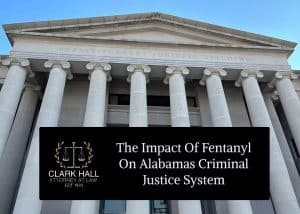## Understanding Fentanyl through Alabama’s Legal Lens
Fentanyl, a powerful synthetic opioid, is making headlines for its role in the opioid crisis, notably affecting the criminal justice systems across the United States, including Alabama. The state has seen a significant uptick in fentanyl-related offenses, stimulating the development of specific laws and regulations aimed at combating its impact. These legal frameworks not only address fentanyl’s distribution and possession but also attempt to manage the broader social consequences it invokes. Alabama law provides an intricate structure to navigate the growing complexities associated with fentanyl, calling for an acute understanding of its provisions and implications.
As fentanyl continues to wreak havoc, its influence on Alabama’s legal landscape is undeniable, underscoring the need for individuals and legal entities to grasp the nuances of the state’s approach. This substance doesn’t merely challenge healthcare systems but also strains law enforcement resources, court processes, and correctional facilities. The intricacies of Alabama’s legal response reflect efforts to mitigate these challenges through stringent measures and comprehensive strategies.
## Exploring the Essentials of Fentanyl Alabama Law
Fentanyl Alabama Law embodies a series of legislative measures and judicial interpretations designed to combat the detriments caused by the opioid crisis. These laws, distinguished by their specificity, aim to deter distribution and possession through a tough-on-crime approach. Core statutes criminalize the unauthorized manufacture, sale, or possession of fentanyl, often resulting in severe penalties that mirror the gravity of the offense.
The legal codification extends to enhanced sentencing provisions. For instance, individuals convicted under these laws may face mandatory minimum sentences, which serve as a deterrent against potential offenders. Moreover, Alabama law includes provisions for educating and training law enforcement officers and judicial entities, ensuring they are better equipped to handle cases that involve fentanyl.
Furthermore, the law strives to facilitate efforts for rehabilitation and treatment alternatives for addicts under judicial supervision. This aspect of the legislation recognizes addiction as a disease requiring a balanced approach of punishment and healing. The unique landscape of Fentanyl Alabama Law reflects a dual commitment to reducing supply-side issues while addressing demand-side repercussions.
## Significance of Addressing Fentanyl in Alabama
The pernicious effects of fentanyl are not only felt by individuals but ripple through entire communities, exerting pressure on public health systems and the legal framework. Addressing fentanyl’s impact is crucial because it poses a significant threat to public safety, highlighting the importance of a learned and adaptive legal system. Recognizing and understanding the legal framework allows for a collective response to deter and remedy these societal issues.
Legal professionals are at the forefront of these efforts, defending individuals’ rights while maintaining the integrity of the justice system under these challenging circumstances. They play a pivotal role in interpreting and applying legislation intended to tackle the crisis. The implications of these laws are profound, influencing both courtrooms and the lives of those entwined in the epidemic.
Moreover, Alabama’s proactive legal stance creates precedents for other states facing similar opioid crises. Consequently, the broader implications for policy and legal reform become a focal point for analysts and lawmakers beyond state lines. A comprehensive understanding of Alabama’s legal dynamics concerning fentanyl can contribute to shaping better national policies.
## Fentanyl’s Legal Influence on Alabama’s Criminal Framework
Fentanyl’s legal ramifications in Alabama are deeply entrenched in the state’s criminal justice framework, transforming how courts operate and interact with offenders. The rise in fentanyl-related offenses necessitates an evolution in both legal practice and judicial interpretation. Law enforcement agencies face increased pressure to tackle offenses, often requiring expanded training and resources to effectively manage these cases.
Courts are tasked with balancing the enforcement of strict sentencing guidelines with the imperative of offering rehabilitation programs. As such, prosecutors and defense attorneys are compelled to navigate complex legal landscapes, advocating vigorously to protect individuals’ rights while acknowledging public safety concerns. Sentencing laws regarding fentanyl offenses are evolving, reflecting increased severity in punishment and augmented discretion in judicial proceedings.
This transformation extends to collaborative efforts between the legal community and public health officials. Developing preventative strategies and legislative reforms require input from various sectors, ensuring that Alabama’s legal response is both effective and comprehensive. The implications of fentanyl-related legislation underscore the need for a legal system that is responsive and resilient in the face of evolving challenges.
## Real-World Applications and Challenges of Fentanyl Law in Alabama
Real-world applications of Fentanyl Alabama Law illustrate its profound and sometimes daunting challenges. Law enforcement agencies consistently battle the publication and privatization of fentanyl, adapting their methodologies to overcome barriers that often accompany these cases. Felony charges correlate directly to quantities of fentanyl seized, creating a sense of urgency in prosecution and defense.
In courtrooms, defense attorneys face the formidable task of navigating complex laws that carry serious punitive consequences. Cases often involve intricate legal arguments about quantities and intent, demanding thorough investigation and preparation. At the same time, prosecutors, armed with rigorous statutes, aim to uphold justice while remaining cognizant of the social implications of their actions.
Legal challenges extend beyond technicalities and legal procedures; they also involve examining the human condition behind each offense. Defense strategies might include advocacy for medical interventions or challenging the proportionality of punitive measures, integrating a human rights perspective with standard legal practice. These real-world applications underscore the breadth and depth of challenges presented by Fentanyl Alabama Law and its practitioners.
## Proactive Measures for Navigating Fentanyl Laws
Understanding and navigating Fentanyl Alabama Law demands a strategic approach from individuals and legal teams alike. Staying informed about legislative updates and judicial interpretations plays a fundamental role in ensuring compliance and protection against potential legal pitfalls. Attorneys and clients alike benefit from proactive education, enabling them to make informed decisions amid complex legal landscapes.
Engaging in preventative measures is critical. For instance, individuals and entities concerned about potential legal encounters should consider auditing their operations or engagements, ensuring adherence to legislation. Proactively addressing potential vulnerabilities can mitigate risks and foster a more secure legal standing.
Additionally, participating in community-based initiatives and educational programs can further aid in understanding and combatting the nuances of fentanyl laws. Such participation fosters engagement and awareness, which is crucial for creating community resilience against the opioid crisis. These steps, both individual and collective, represent key pieces in the larger puzzle of comprehensive legal compliance and community protection.
## Navigating Common Pitfalls of Fentanyl-related Legal Proceedings
Legal practitioners and clients frequently encounter a range of common mistakes in attempting to address fentanyl-related issues. Misinterpretation or unfamiliarity with the nuances of Fentanyl Alabama Law can lead to detrimental consequences, from missteps in defense strategies to accidental statutory breaches.
One prevalent error involves the handling of evidentiary procedures. Mismanaging evidence or lacking thorough documentation may undermine cases significantly, tipping the scales unfavorably in court. Legal counsel must meticulously navigate these processes, ensuring that all evidence is handled in compliance with legal standards.
Another common mistake lies in underestimating the seriousness of charges. Offenders or clients may not recognize the severity of the legal implications involving fentanyl, resulting in imprudent decisions or complacency. Awareness and education about the law’s rigors and consequences are vital for establishing a realistic understanding of what such cases entail.
Additionally, overlooking the importance of a strong legal representation early in proceedings is a frequent oversight. Individuals facing charges may delay seeking legal counsel, missing critical opportunities for defense improvement or negotiation. An informed and timely response is key to effectively addressing the implications of fentanyl law.
## Determining When Legal Consultation is Necessary
Legal issues surrounding fentanyl warrant a thorough assessment to determine the necessity of professional legal consultation. The complex nature of Fentanyl Alabama Law often requires nuanced understanding and expertise to navigate successfully. Consulting an attorney is not only advisable but crucial in effectively managing these legal challenges.
Situational factors, such as the severity of charges or the presence of new legislative measures, contribute significantly to the need for professional legal guidance. Knowing when to involve an attorney is paramount, especially in criminal cases. Early engagement allows for strategic development, ensuring that all necessary defenses are considered promptly.
Moreover, attorneys provide valuable insights and legal interpretations that might otherwise elude individuals unfamiliar with intricate laws. Their involvement lends clarity to the context of charges, defending against potential injustices and facilitating informed decision-making. Legal representation thus becomes an essential aspect of safeguarding rights and navigating the judicial system effectively.
## The Advantages of Engaging Legal Representation
Engaging a legal representative in the context of fentanyl-related legal matters offers distinct advantages, especially given the complexities surrounding Fentanyl Alabama Law. Attorneys bring specialized knowledge and experience to the table, empowering clients through comprehensive legal strategies tailored to their unique circumstances.
Legal representatives play a pivotal role in advocating for individuals while ensuring compliance with procedural requirements. They construct robust cases by leveraging existing knowledge of legal precedents, effectively mitigating potential consequences. The strategic interpretation of laws by an attorney can mean the difference between severe penalties and favorable outcomes.
Furthermore, an attorney serves as a crucial advisor, helping individuals make sound decisions by providing clarity on legal options. They negotiate plea deals, pursue alternatives to incarceration, and navigate the intricacies of Alabama’s legal system. Engaging legal representation thus ensures that individuals receive an equitable application of justice, grounded in strategic legal thinking and action.
## Assistance from Clark Hall, Attorney at Law
Clark Hall, Attorney at Law, stands as a premier choice for individuals grappling with the complex challenges of Fentanyl Alabama Law. With a robust reputation in Alabama’s legal community, Clark Hall delivers strategic, personalized legal services designed to navigate the intricate opioid-related regulations effectively.
Renowned for his comprehensive approach, Clark Hall offers clients exceptional support, employing strategic foresight to protect their rights and interests. His practice is characterized by a commitment to advocating for fair legal proceedings, ensuring access to justice in the face of rigorous legal frameworks. Clients benefit from tailored legal strategies, reducing potential penalties and securing favorable outcomes.
Moreover, Clark Hall’s practice integrates a holistic understanding of the legal environment, emphasizing the dual nature of punitive and rehabilitative measures under Alabama’s legal provisions. He collaborates with clients, guiding them through every step of the legal process with empathy and skill. For those confronting the implications of fentanyl law, Clark Hall is a reliable partner in navigating Alabama’s evolving legal landscape.
## Frequently Asked Questions About Fentanyl Alabama Law




